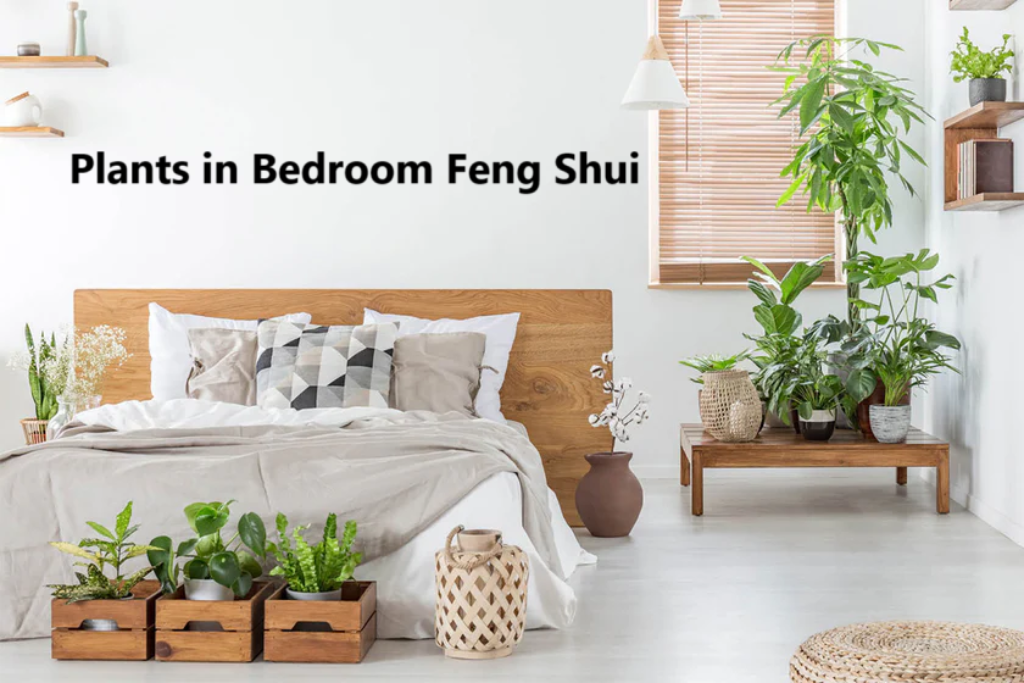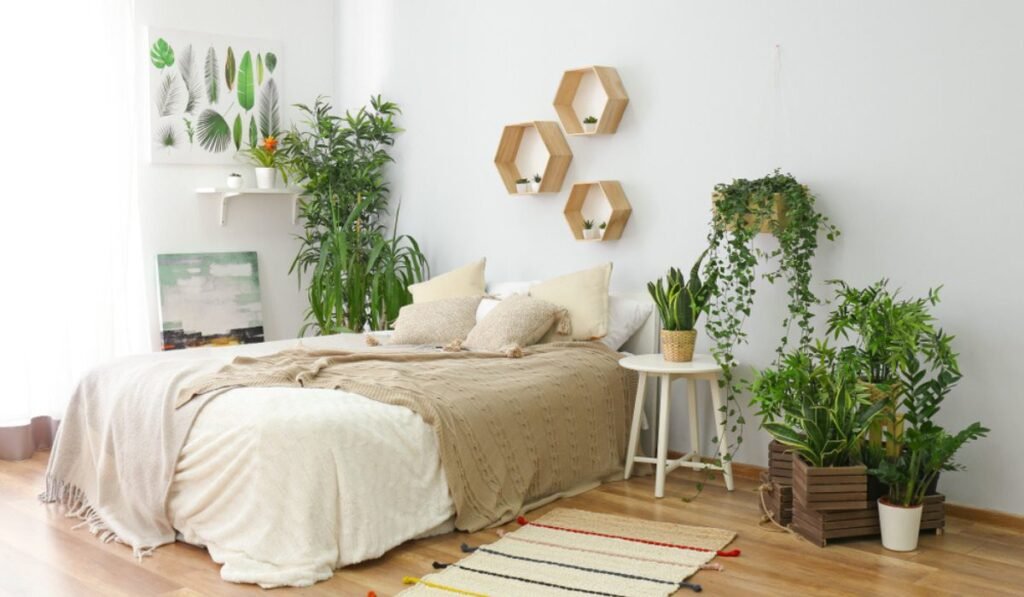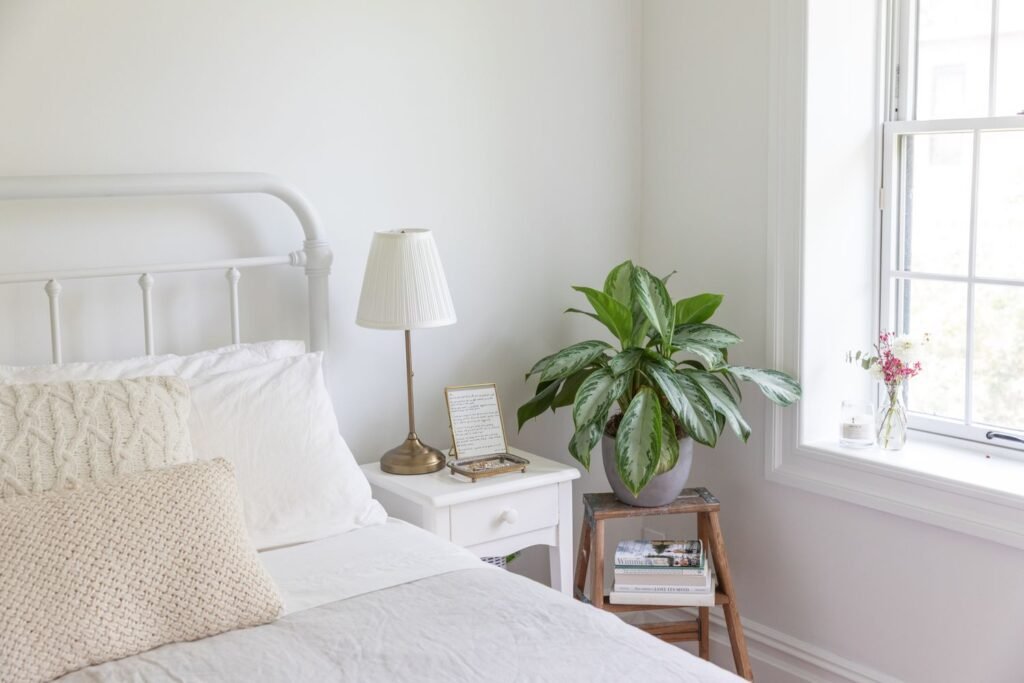Are plants in bedroom feng shui bad or good? When it comes to Feng Shui, the elements you choose to bring into it is just as important as the arrangement of your space. One element that can have a major impact on your bedroom’s energy is plants. Whether you’re looking to create a calming atmosphere, improve air quality, or enhance your relationships, the right plants in the bedroom can make a huge difference. CBut can they really help balance energy? Let’s explore the best practices for incorporating plants into bedroom Feng Shui.

Are Plants in the Bedroom Good Feng Shui?
Plants into bedroom Feng Shui are generally considered a powerful way to boost the wood element in your home. The wood element is associated with growth, vitality, and renewal, and adding plants to your bedroom can create a space that feels alive and energized. Plants not only contribute to positive energy (Chi) but also offer numerous practical benefits, like improving air quality and fostering relaxation.
However, it’s important to keep in mind that too many plants or placing them in the wrong areas can disrupt the room’s flow, making it feel chaotic rather than peaceful. To get the best results, it’s about choosing the right plants and strategically placing them to support a balanced, harmonious environment.
Common Benefits of Plants in Bedroom Feng Shui:
- Boosts air quality: Plants like the snake plant and peace lily are great for purifying the air. They help filter out toxins and increase oxygen levels, making your bedroom a healthier space to sleep in. Cleaner air can reduce allergens, and better air circulation promotes restful sleep.
- Promotes relaxation: Plants with soft, rounded leaves, such as the jade plant or spider plant, are perfect for promoting relaxation. These plants help create a calming atmosphere, which can reduce stress and anxiety. Being surrounded by greenery has also been shown to lower cortisol levels, making it easier for your body to relax after a long day.
- Encourages growth: Placing plants in the relationship corner of your bedroom, which is located in the far right corner from the entrance, can help promote harmony in your personal relationships. In Feng Shui, this area is linked with partnerships, so nurturing it with plants symbolizes growth, renewal, and a flourishing relationship. Whether you’re focusing on strengthening a romantic relationship or personal growth, the right plant in this spot can act as a symbol of positivity and progress.
By choosing the right plants for your bedroom, you can create a space that feels balanced and supportive of your well-being. Plants are more than just decor – they are tools for promoting good health, mental clarity, and emotional balance, which makes them an essential part of any bedroom Feng Shui plan.

Choose the Right Types of Plants in Bedroom Feng Shui
When it comes to Feng Shui, not all plants are equal. Some can enhance the energy in your bedroom, while others may disrupt the peaceful, balanced atmosphere you’re trying to create. The right plants can improve air quality, promote relaxation, and bring in positive energy, but it’s important to choose plants that align with the space and its purpose. Let’s take a closer look at some of the best feng shui and plants in bedroom.
Snake Plant in Bedroom Feng Shui
The snake plant, also known as Mother-in-Law’s Tongue, is a top choice for Feng Shui. This plant is not only stylish but incredibly effective at purifying the air. It’s known to remove toxins, which is perfect for creating a healthier sleep environment. The snake plant thrives in low light, making it an excellent option for most bedrooms.

KOL 3ft 2-Pack Artificial Snake Plant Fake Sansevieria Indoor Decor, 32 Thick Leaves Lifelike Faux Silk Plant, Home Garden Decor Mother in Law Tongue Plant 35in, Fake Sansevieria Faux Potted, Green B0CHVV3RJ6

Altman Plants, Live Snake Plant, Sansevieria trifasciata Superba, Fully Rooted Indoor House Plant in Pot, Mother in Law Tongue Sansevieria Plant, Potted Succulent Plant, Houseplant in Potting Soil B0BM6WL5L3

Altman Plants Sansevieria Zeylanica Variegated Snake Plants (Approx. 6″ Tall), Easy Plant, Air Purifying Plant & Desk Plant Decor, Low Light Live Snake Plant Live Plants, Indoor Plants & Houseplants B0D8RLZ51V

Costa Farms Premium Live Indoor Snake Sansevieria Floor Plant Shipped in Décor Planter, 2-Feet Tall, Grower’s Choice, Green, Yellow B07FMH9LHD
Its upright, sword-like leaves are also believed to provide protection and bring positive energy into the room. Plus, the plant’s natural upright shape promotes stability and strength, aligning perfectly with Feng Shui principles.
Spider Plant in Bedroom Feng Shui
The spider plant is another excellent option for the bedroom. With its easy care and air-purifying qualities, it makes a perfect addition to your space. The plant’s cascading vines symbolize growth and vitality, adding a nurturing, positive energy to the room.
Spider plants are also versatile, they can thrive in a range of light conditions and require minimal maintenance, which makes them ideal for busy people. Placing a spider plant near a window ensures that it gets the right amount of light, and it will help keep your room fresh and inviting.
Lucky Bamboo Plant in Bedroom Feng Shui
The bamboo plant holds significant meaning in Feng Shui, as it is known to bring good luck, prosperity, and positive energy. A lucky bamboo plant is often placed in the wealth corner of the room (the far left corner from the entrance) to attract financial abundance and opportunities.
Bamboo’s long, slender stalks represent flexibility and growth, both of which are essential qualities for a harmonious environment. Bamboo is also low-maintenance and thrives in indirect light, making it a perfect plant for your bedroom.

Arcadia Garden Products LV25 5-Stem Lucky Bamboo, Live Indoor Plant in Aged Wood Planter for Home, Work, or Gift, Dark ***Cannot Ship to Hawaii** B09CNTDG12
Jade Plant in Bedroom Feng Shui
The jade plant, with its thick, round leaves, is commonly associated with wealth and prosperity in Feng Shui. It’s often placed in the wealth corner or on a nightstand to symbolize stability and growth. The jade plant’s thick, sturdy leaves are thought to bring in positive energy and good fortune.
Its presence can encourage a balanced, thriving environment, which is important for both financial and personal growth. Keep it in a spot where it can receive indirect sunlight, and it will continue to bring good energy into your space. See How to Care for Jade Plant Indoors and Outdoors

Costa Farms Succulent Live Plant, Jade Plant, Potted in Modern Decor Planter with Potting Soil Mix, Beautiful Room or Office Decor, Housewarming, Birthday Gift, 6-Inches Tall B07C8NSQLL

Jade Plant – Crassula – Easy to Grow – Hard to Kill – Cactus – 4″ Pot- Living Succulant, Succulents Plant Live, Succulent Plants Fully Rooted, Houseplant for Home Office Decor B0CLBDCXC8

Jade Plant 4″ Crassula Ovata Jade Compact Succulent Plants Live, Easy to Grow Hard to Kill Houseplant by The Succulent Cult B0CLZ5VGG8
Live Plant in Bedroom Feng Shui
When choosing plants for your bedroom, live plants are always the best choice. Unlike fake plants, live plants bring in fresh, vibrant energy and promote life and vitality. They are seen as energetic beings that continuously interact with their environment, boosting air quality and contributing to the overall mood of the room.
Fake plants, on the other hand, are believed to bring stagnant energy, which can affect the flow of Chi and create a lifeless atmosphere. If you’re looking for genuine energy in your space, it’s best to opt for real plants.
Flowering Plants
While live plants are preferred, it’s important to choose the right types of plants for the bedroom. Flowering plants, like orchids or lavender, are beautiful and soothing, but they should be used sparingly.
Too many blooming plants can create an overabundance of “yang” energy, which might make the room feel overly stimulating and disrupt relaxation. Instead, focus on greenery that adds tranquility without overwhelming the space.
Avoid Thorny or Spiky Plants
Although some may enjoy the look of cacti or other spiky plants, Feng Shui advises against placing them in the bedroom. These plants are often seen as bringing sharp, negative energy that can disrupt the peaceful atmosphere. The pointed thorns can symbolize aggression or harshness, which is not conducive to a restful environment.
If you like the look of succulents or other low-maintenance plants, opt for ones with soft, rounded leaves instead. These kinds of plants promote a more nurturing, gentle energy in the bedroom, encouraging relaxation and balance.
Where to Put Plants in Bedroom Feng Shui
Knowing where to put plants in bedroom Feng Shui is just as crucial as choosing the right plants. Proper placement can amplify the positive energy, while poor placement can create stagnant or overwhelming energy that disrupts the room’s peaceful flow. So, if you want to bring in balance and good vibes, here are some key areas to consider.
Ideal Areas for Plants in the Bedroom
Near the Windows
Most plants thrive on natural light, making windows the perfect spots for them. When placed near windows, plants can soak up sunlight, which energizes the room and supports the wood element in Feng Shui, which symbolizes growth and vitality. The natural light also keeps the plants healthy, adding to the overall positive energy in the room. Just make sure that the plants are not sitting directly in harsh sunlight for long hours, as this could overheat or dry them out. A spot that gets indirect sunlight for part of the day is often ideal.

Far Right Corner (Relationship Corner)
In Feng Shui, each corner of the room is associated with different aspects of life. The far right corner of your bedroom, when you stand at the door looking in, is tied to your relationships. Whether you’re seeking harmony in a romantic relationship, family, or friendships, placing plants in this corner is believed to enhance the energy around these connections. Opt for plants with soft, rounded leaves as they can help improve the flow of love and positivity in your relationships, making your space feel more harmonious and supportive.
Near the Door (Wealth Corner)
Another important Feng Shui area is the far left corner of your bedroom, often referred to as the wealth corner. This is where you can place plants like bamboo or jade to encourage prosperity and abundance. Bamboo is often associated with luck and financial growth, while jade plants symbolize wealth and stability. By placing these plants in the wealth corner, you help bring positive energy to your financial life and overall success.

Arcadia Garden Products LV25 5-Stem Lucky Bamboo, Live Indoor Plant in Aged Wood Planter for Home, Work, or Gift, Dark ***Cannot Ship to Hawaii** B09CNTDG12
Consider the Bagua Map
If you want to take your plant placement a step further, consider using the Bagua map, a tool in Feng Shui that helps map out energy flow in a space. The map divides your room into nine key areas, each connected to a different aspect of your life, like wealth, relationships, and health. By aligning the Bagua map with your bedroom, you can place plants in specific areas that correspond to the parts of your life you want to enhance.
For example, if you’re focusing on improving relationships, placing plants in the relationship corner (the far-right corner of your bedroom) can help activate positive energy in that area.
However, it’s important not to overdo it. Try focusing on just two or three areas at a time, rather than trying to activate every corner of your room all at once. By selectively placing plants in key areas, you can support the energy flow in a more balanced and effective way.
You may like:
Free Download Feng Shui Vision Board Template
Areas to Avoid for Plant Placement
Near the Bed (Especially Above the Bed)
While plants can bring in positive energy, placing them too close to your bed can interfere with restful sleep. Feng Shui recommends that plants be kept at a distance from your sleeping area to avoid any disruptions to the calm, restful energy your bedroom needs. In particular, placing plants directly above your bed, such as hanging plants, may create a feeling of heaviness or imbalance. This could negatively affect your sleep and your overall sense of relaxation.
Avoid Thorny or Spiky Plants Near the Bed
As we mentioned earlier, thorny or spiky plants like cacti or certain succulents should be avoided near the bed in Feng Shui. These plants are seen as bringing sharp, negative energy that could disrupt the peaceful, calm atmosphere you want in your bedroom. Instead, focus on plants with soft, rounded leaves, which create a more nurturing and soothing environment.
Are Fake Plants in Bedroom Bad Feng Shui?
You might be considering fake plants in bedroom Feng Shui for convenience, but traditionally, real plants are always the preferred option in Feng Shui. Here’s why: live plants are full of life energy (Chi), and they help keep the space vibrant, clean, and fresh. On the other hand, artificial plants lack this living energy and are often thought to contribute to stagnant, lifeless energy, which can create a sense of imbalance in your bedroom.
Fake plants don’t interact with the environment the same way real plants do. They don’t improve air quality or promote the same feeling of calm and renewal. As a result, they are generally believed to bring in stagnant energy, which can affect the overall harmony of the room.
However, there are exceptions. If you suffer from allergies to live plants or if your bedroom doesn’t get much natural light, you might have no choice but to opt for artificial plants. If you do go this route, make sure to select high-quality fake plants that closely mimic the appearance of real greenery. While they won’t bring in the same positive energy as live plants, they can still add some visual appeal and softness to the room. Just keep in mind that real plants are always the ideal choice for fostering a positive, lively environment.
7 Important Tips for Plants in Bedroom Feng Shui
Adding plants to your bedroom can be a wonderful way to enhance the energy in the room, but it’s important to place them carefully to ensure they’re supporting positive energy flow. Here are some key tips for plants in bedroom feng shui that will help you create a balanced, harmonious space:
1. Avoid Plants with Thorns
While some people love the aesthetic of cacti or other thorny plants, in Feng Shui, these types of plants are best avoided in the bedroom. Thorny plants are believed to bring sharp, negative energy, which can disrupt the calm and peaceful atmosphere you want to create. Instead, opt for plants with smooth, rounded leaves, like the jade plant or spider plant, which promote a gentle, nurturing energy that enhances relaxation.
2. Don’t Overcrowd Your Space
It’s easy to get excited about the idea of having multiple plants in your bedroom, but too many plants can create an overly cluttered or chaotic energy. In Feng Shui, balance is key, so it’s important to select a few plants that complement the space without overwhelming it. Carefully consider the size and placement of each plant, and make sure they align with the room’s design. A few well-placed plants can significantly enhance the room’s energy, but overcrowding can have the opposite effect, making the space feel chaotic and crowded.
3. Number of Plants: Odd Numbers Are Best
When it comes to the number of plants, Feng Shui generally favors having an odd number, such as 1, 3, or 5 plants, in a room. This is believed to create a more balanced, dynamic energy that flows freely throughout the space. Odd numbers are often seen as more harmonious, while even numbers can feel too static or uniform, potentially causing energy to get stuck.
However, it’s not just about the number of plants, it’s also about balance. Too many plants, even if they’re in odd numbers, can still crowd the space and overwhelm the energy. The key is to choose an amount that feels right for the room, keeping the overall atmosphere calm and inviting.
4. Keep Plants Healthy
One of the most important tips in Feng Shui is to keep your plants healthy. Dead, wilting, or neglected plants can introduce stagnant, negative energy into your space. To avoid this, make sure to regularly care for your plants by watering them, pruning them, and ensuring they get the right amount of light. Healthy, vibrant plants will contribute to a fresh, lively energy in your bedroom, whereas unhealthy plants can drain energy and make the room feel heavy.
5. Place Plants in the Right Zones
According to Feng Shui, certain areas of your bedroom are connected to specific aspects of life, like relationships, wealth, or health. For example, the far right corner of your bedroom is the relationship corner, and placing a plant like a bamboo plant or jade plant here can help encourage harmony and growth in your relationships. The wealth corner (the far left corner) is another great place to add plants that promote abundance and prosperity. Align your plants with these zones to support the specific energies you want to invite into your life.
6. Avoid Placing Plants Directly Above the Bed
In Feng Shui, it’s best to avoid placing plants directly above your bed. Hanging plants or shelves full of plants over your bed can create a sense of heaviness or instability, which could disrupt your sleep or cause stress. Instead, place your plants at a safe distance from your bed—either on the floor or a nearby table. This helps maintain a calm and restful energy around your sleeping area, which is essential for a good night’s sleep.
7. Choose Plants that Reflect Your Intentions
In Feng Shui, plants are not just for decoration—they’re also tools to help manifest certain goals or energies. Choose plants that align with your intentions. For example, if you’re focused on improving your health, consider placing a snake plant or peace lily near your bed, as both are known for their air-purifying properties. If you’re looking to boost your finances, consider adding a jade plant to the wealth corner of your room. By intentionally placing plants based on their symbolic meaning, you can attract the energy you want.
Conclusion
Incorporating plants into your bedroom is a powerful way to enhance its Feng Shui and create a calming, balanced space. From air-purifying plants to fortune-bringing bamboo and jade plants, choosing the right plants and placing them thoughtfully can significantly improve the energy of your room. Just be sure to keep plants healthy, avoid fake plants when possible, and be mindful of their placement to get the best results.
By following these simple tips for plants into bedroom Feng Shui, you can transform your living space into a peaceful sanctuary that supports your health, relationships, and overall well-being.










